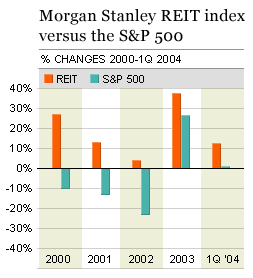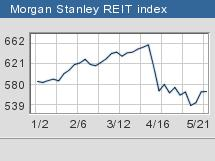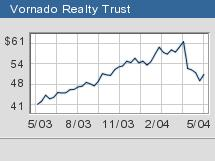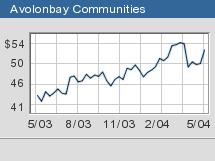NEW YORK (CNN/Money) -
REITs were the big man on campus in the first quarter of '04 and through all of last year's rally. But since the release of the March payrolls report in early April, the sector's been tumbling hard.
For some analysts and investors, that's pretty straightforward. An improving labor market likely coincides with a rising interest rate environment, which can erode the profits of Real Estate Investment Trusts (REITs) -- companies that own portfolios of properties or sometimes mortgages -- and the mutual funds that host them.

The safe-haven REITs have been good to many investors looking for a fairly steady, conservative return, both during the three-year bear market and even during last year's recovery. So, the thinking goes, might as well cash out now, before rates rise and returns diminish.
While that's a valid argument, some analysts say it's not a foregone conclusion that REITs suffer with higher rates. They argue that a rising rate cycle coincides with a strong economy, which would be good for all property types. A stronger economy and improved labor market mean more business spending, higher rental fees, as well as fewer vacancies. If you have REITs, they argue, keep 'em. And if you don't, consider using the recent selloff as a buying opportunity. As long as you're not expecting a quick return.
"I think there are some very good opportunities in the REIT market for long-term investors, with a three year to five year time horizon," said Kevin Bedell, senior vice president, and head of research and analysis for the Security Capital U.S. Real Estate (SUSIX: Research, Estimates) fund. "But due to the shifting macro-economic environment, we're likely to see some 'edge of your seat' price volatility in the short-term."
Why REITs?
REITs and REIT funds appeal to investors during bear markets or times of extreme market fluctuations for the same reason bonds and bond funds do -- they're not very sexy, but they do offer a steady rate of return.

When interest rates are lower, the economy is struggling and people are nervous about stocks, they start pouring money into bonds. That pushes down the bond yields -- since bond prices and yields move in opposite directions. With bonds not yielding as much, for some investors this makes the comparatively better dividend yield on REITs seem awfully appealing, so the REITs do well.
Alternately, in a rising rate environment, bond prices fall and yields rise as investors switch money into stocks and other investments that have more aggressive returns than bonds or REITs. In this environment, REIT stock prices tend to fall, as a means of lifting their dividend yields and making them more competitive with bonds.
That's what's been happening lately, said Dan McNeela, a senior analyst at Morningstar who covers the sector.
"Real estate funds have pulled back about 15 percent since early April and therefore they're certainly cheaper than they were six weeks ago," McNeela said. "However, after several years of rallying REITs were already trading at pretty lofty levels before the pullback."
During the recent bear market, in which stock indexes declined for three years straight, the Morgan Stanley REIT (Charts) Index yielded investors total returns of nearly 27 percent in 2000, almost 13 percent in 2001 and around 3.5 percent in 2002.
In 2003, interest rates held steady, stocks recovered, and both bonds and REITs continued to do well, with the Morgan Stanley index gaining close to 37 percent. In the first quarter of 2004, the index rallied 12 percent, but has been stumbling since then.
Between the first quarter 2004 runup and the recent pullback, the 50 REIT stocks his firm covers are down about 3 percent year-to-date, said Jay Leupp, managing director at RBC Capital Markets. His outlook on the sector is for about a 7 percent total return this year.
"We see the recent pullback as a selective buying opportunity," Leupp said. "There's nothing that's particularly cheap, but we like a few names in the mall, apartment and self-storage sectors."
If so, which ones?
REITs are divvied up into a number of sectors, including office properties, retails, including malls, industrials, hotels and multi-family homes or apartments.
Several of the analysts thought that for the short term, particularly between now and the end of 2004, hotel REITs, which tend to hold shorter leases, are better positioned for the initial bout of higher rates that is likely to happen this year.
"The most responsive group relative to potential near-term changes is the hotel sector," said Morningstar's McNeela. "If the economy is expanding and business spending is picking up, so will business travel."
He said the sector is also at an advantage in that hotel leases tend to run just a few days versus office leases, which can run five years to 10 years, and therefore take longer to reflect the changes in the economy.
All of the analysts said that much longer term, office properties will probably do well, thanks to a recovering economy and job market, but that it will take some time for the changes in the economy to impact rates and cash flow for these companies.

In that sector, Leupp likes Vornado (VNO: Research, Estimates), a REIT whose dividend yield -- at around 5 percent -- should hold up even when rates start rising. Security Capital's Bedell likes Corporate Office Properties Trust (OFC: Research, Estimates), because he says it has a unique niche in defense properties and Reckson Associates Realty (RA: Research, Estimates), which he says is staging a comeback.
RBC's Leupp also likes the mall stocks, saying most of the REITS he covers trade at 12 times current year earnings, but that the mall stocks mostly trade at 10-1/2 times earnings, which makes them a better value. He thinks they will likely sustain decent earnings growth even as the economy recovers.
"We are most favorable right now on the mall companies, due to expectations for increased cash flow growth as well as valuation," said Dan Oppenheim, an equity analyst at Banc of America Securities who covers the sector. In the short-term, he is most cautious on the multi-family, or apartment REITs based on their high valuations.
Looking out much longer term, both Security Capital's Bedell and RBC Capital's Leupp said the apartment REITs have nearly bottomed and should see a turnaround.

That sector of REITs has been hit recently because of the struggling job market and refinancing boom, which has created higher vacancy rates and pricing pressure for rentals.
Looking in a three to five year horizon, Bedell says that companies including Avalonbay Communities (AVB: Research, Estimates) and Essex Property Trust (ESS: Research, Estimates) "tend to be where we are driving our portfolio." Security Capital U.S. Real Estate owned both stocks at the end of the first quarter.
In terms of sectors that tend to not do as well in a rising rate environment, Leupp cites the neighborhood shopping centers.

-- Analysts quoted in the story don't own shares of the stocks discussed, nor do their firms make a market in those companies.
|

